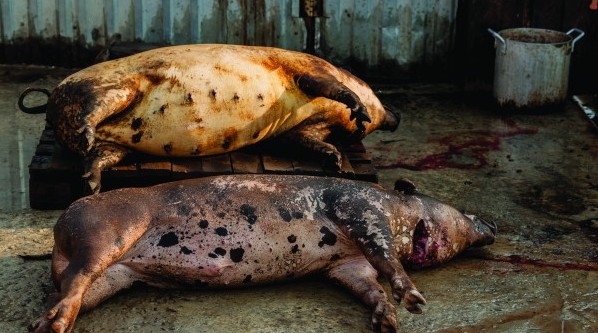The Government has estimated that an African swine fever (ASF) outbreak could cost the UK pig industry £85 million.
 David Rutley, a Parliamentary Under-Secretary at Defra, said the Government has estimated that a ‘reasonable worst case scenario’ outbreak could cost the UK up to £90m at 2019 prices. This includes costs to the industry of up to £85m, reflecting the lost value of animals from culling, movement bans and trade restrictions, as well as costs of up to £5m for the Government for disease control activities.
David Rutley, a Parliamentary Under-Secretary at Defra, said the Government has estimated that a ‘reasonable worst case scenario’ outbreak could cost the UK up to £90m at 2019 prices. This includes costs to the industry of up to £85m, reflecting the lost value of animals from culling, movement bans and trade restrictions, as well as costs of up to £5m for the Government for disease control activities.
While this estimate represents an ‘informed assessment’ of the potential impact of an outbreak, the true cost will depend on a number of factors, including geographic location, the husbandry system, epidemiology of the outbreak and whether wildlife was involved, he added. The NPA stressed that it could be even higher, particularly when lost export markets are factored in.
Mr Rutley was responding to a series of questions about ASF posed by Cleethorpes MP Martin Vickers, who raised the issue following a meeting with NPA members at the Lincolnshire Show.
Border controls
The issue of UK border controls has taken on added significance since the discovery of ASF DNA in illegally imported meat seized by port authorities in Northern Ireland.
Asked what additional resource has been allocated to the UK border force, Mr Rutley said Defra was working with Border Force to focus communications on passengers travelling through ports and airports when returning to the UK from the EU and Asia.
“We are in the process of developing a set of communications that will be distributed across UK ports and airports informing people of the disease risk and asking that they do not bring personal pork imports into the UK. These messages will be communicated through a combination of posters, leaflets, and social media” he said.
Defra is currently working with UK Border Force to improve intelligence sharing and targeting, he added. The Department and the Animal and Plant Health Agency routinely provide UK Border Force with information and risk assessments on countries where there is a heightened risk of animal diseases such as African swine fever.
Raising awareness
Mr Rutley also outlined the steps Defra is taking to inform people entering the UK of the dangers of bringing in meat from areas affected by ASF.
He said Defra was working with the devolved administrations, the pig industry and veterinary bodies on a communications campaign to raise awareness of the risks of the introduction of ASF to the UK and what can be done to reduce the risk of entry into the UK pig herd or feral wild boar populations.
“Messaging has targeted key audiences including transport operators, tourists to specific regions, and other people returning from affected regions. Additionally, we have been speaking to both professional and backyard pig keepers about the dangers and risk of ASF, to encourage best practice and ensure disease prevention,” he said.
“We have also run a targeted communication campaign to raise awareness of the particular risks of bringing pork products into the UK from affected areas, including the emphasis on the importance of safely disposing of any unwanted pork products.”
NPA senior policy advisor Ed Barker said he was pleased to see the ASF threat being discussed more frequently in Parliament. “We note that the Government estimates that an ASF outbreak could cost the industry £85m. We believe the real cost could be much higher, especially when the loss of pork exports, worth nearly £500 million in 2018, is taken into account.”




